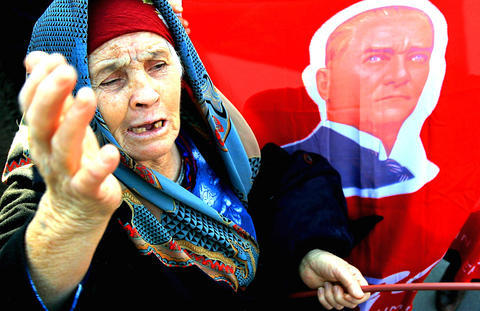Turkey's parliament voted on Saturday to lift a ban on Islamic headscarves at universities, handing victory to the Islamist-rooted ruling party as tens of thousands protested the deeply controversial move.
The constitutional reform package tabled by the ruling Justice and Development Party (AKP) received 411 "yes" votes in the 550-seat house, parliament speaker Koksal Toptan said.
The new legislation, which was backed by the opposition Nationalist Action Party, needed only 367 votes to pass.

PHOTO: EPA
As parliament was voting, tens of thousands of people waving Turkish flags and carrying pictures of modern Turkey's founder Mustafa Kemal Ataturk, packed a square in downtown Ankara to voice their opposition.
Secularists -- among them the army, the judiciary and academics -- see the headscarf as a symbol of defiance against the strict separation of state and religion, a basic tenet of the mainly Muslim country.
"Turkey is secular and will remain secular," shouted protesters, among them many women, including some wearing headscarves.
"What is being done today in parliament is to eliminate the republican regime and replace it with bigotry," Gokhan Gunaydin, from the organizing committee, told the crowd to loud applause.
A police officer at the rally estimated that the crowd was less than 100,000 people while television channels put the number as high as 200,000. A similar demonstration drew more than 125,000 people last weekend.
"Tayyip, take your headscarf and stuff it," said the demonstrators in Ankara, calling on the government of Turkish Prime Minister Recep Tayyip Erdogan to resign.
The AKP says the headscarf ban, which was imposed after the 1980 military coup, is a violation of the freedom of conscience and the right to education.
"Secularism, which does not mean irreligion, requires equal treatment of different religious beliefs," senior AKP lawmaker Sadullah Ergin said on the NTV news channel after the vote.
"We have ended the different treatment of people on grounds of their religious beliefs," he said.
The package amends the Constitution to read that the state will treat everyone equally when it provides services such as university courses and that no one can be barred from education for reasons not clearly laid down by law, an allusion to young women who wear headscarves.
It now needs to be approved by Turkish President Abdullah Gul, a former AKP member who has yet to veto any law put forward by the government.
But the controversy is far from over, as the Republican People's Party, Turkey's strictly secular main opposition, has threatened to challenge the reform at the constitutional court.
The ban, upheld by the country's highest courts, has been implemented at varying degrees over the years, forcing many women to abandon their education and others to hide their headscarves under wigs to attend classes.
The secular camp says easing the restriction in universities will put pressure on women to cover up and pave the way for the lifting of a similar ban in high schools and government offices.

Former Nicaraguan president Violeta Chamorro, who brought peace to Nicaragua after years of war and was the first woman elected president in the Americas, died on Saturday at the age of 95, her family said. Chamorro, who ruled the poor Central American country from 1990 to 1997, “died in peace, surrounded by the affection and love of her children,” said a statement issued by her four children. As president, Chamorro ended a civil war that had raged for much of the 1980s as US-backed rebels known as the “Contras” fought the leftist Sandinista government. That conflict made Nicaragua one of

COMPETITION: The US and Russia make up about 90 percent of the world stockpile and are adding new versions, while China’s nuclear force is steadily rising, SIPRI said Most of the world’s nuclear-armed states continued to modernize their arsenals last year, setting the stage for a new nuclear arms race, the Stockholm International Peace Research Institute (SIPRI) said yesterday. Nuclear powers including the US and Russia — which account for about 90 percent of the world’s stockpile — had spent time last year “upgrading existing weapons and adding newer versions,” researchers said. Since the end of the Cold War, old warheads have generally been dismantled quicker than new ones have been deployed, resulting in a decrease in the overall number of warheads. However, SIPRI said that the trend was likely

NUCLEAR WARNING: Elites are carelessly fomenting fear and tensions between nuclear powers, perhaps because they have access to shelters, Tulsi Gabbard said After a trip to Hiroshima, US Director of National Intelligence Tulsi Gabbard on Tuesday warned that “warmongers” were pushing the world to the brink of nuclear war. Gabbard did not specify her concerns. Gabbard posted on social media a video of grisly footage from the world’s first nuclear attack and of her staring reflectively at the Hiroshima Peace Memorial. On Aug. 6, 1945, the US obliterated Hiroshima, killing 140,000 people in the explosion and by the end of the year from the uranium bomb’s effects. Three days later, a US plane dropped a plutonium bomb on Nagasaki, leaving abut 74,000 people dead by the

Indian Prime Minister Narendra Modi is to visit Canada next week, his first since relations plummeted after the assassination of a Canadian Sikh separatist in Vancouver, triggering diplomatic expulsions and hitting trade. Analysts hope it is a step toward repairing ties that soured in 2023, after then-Canadian prime minister Justin Trudeau pointed the finger at New Delhi’s involvement in murdering Hardeep Singh Nijjar, claims India furiously denied. An invitation extended by new Canadian Prime Minister Mark Carney to Modi to attend the G7 leaders summit in Canada offers a chance to “reset” relations, former Indian diplomat Harsh Vardhan Shringla said. “This is a